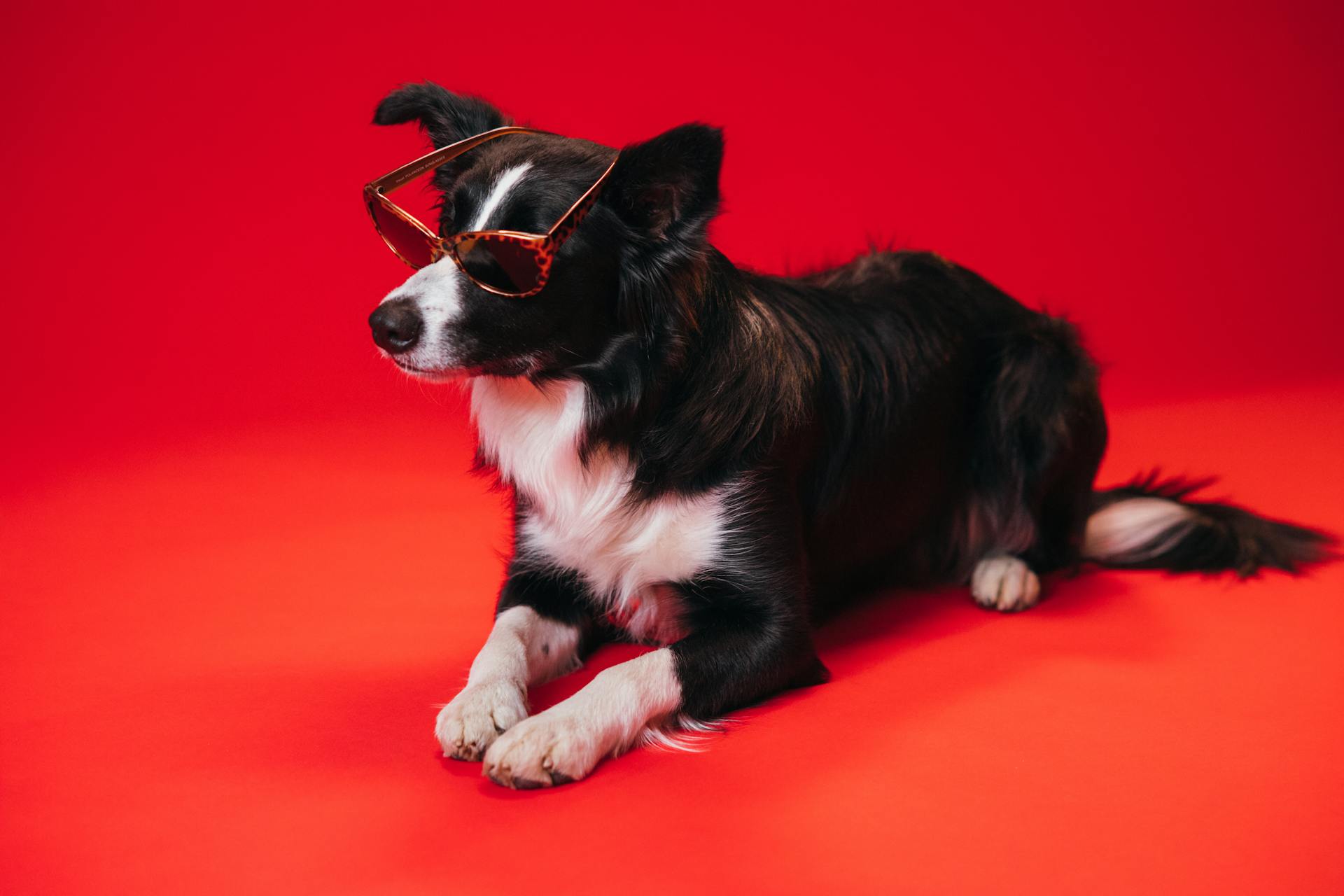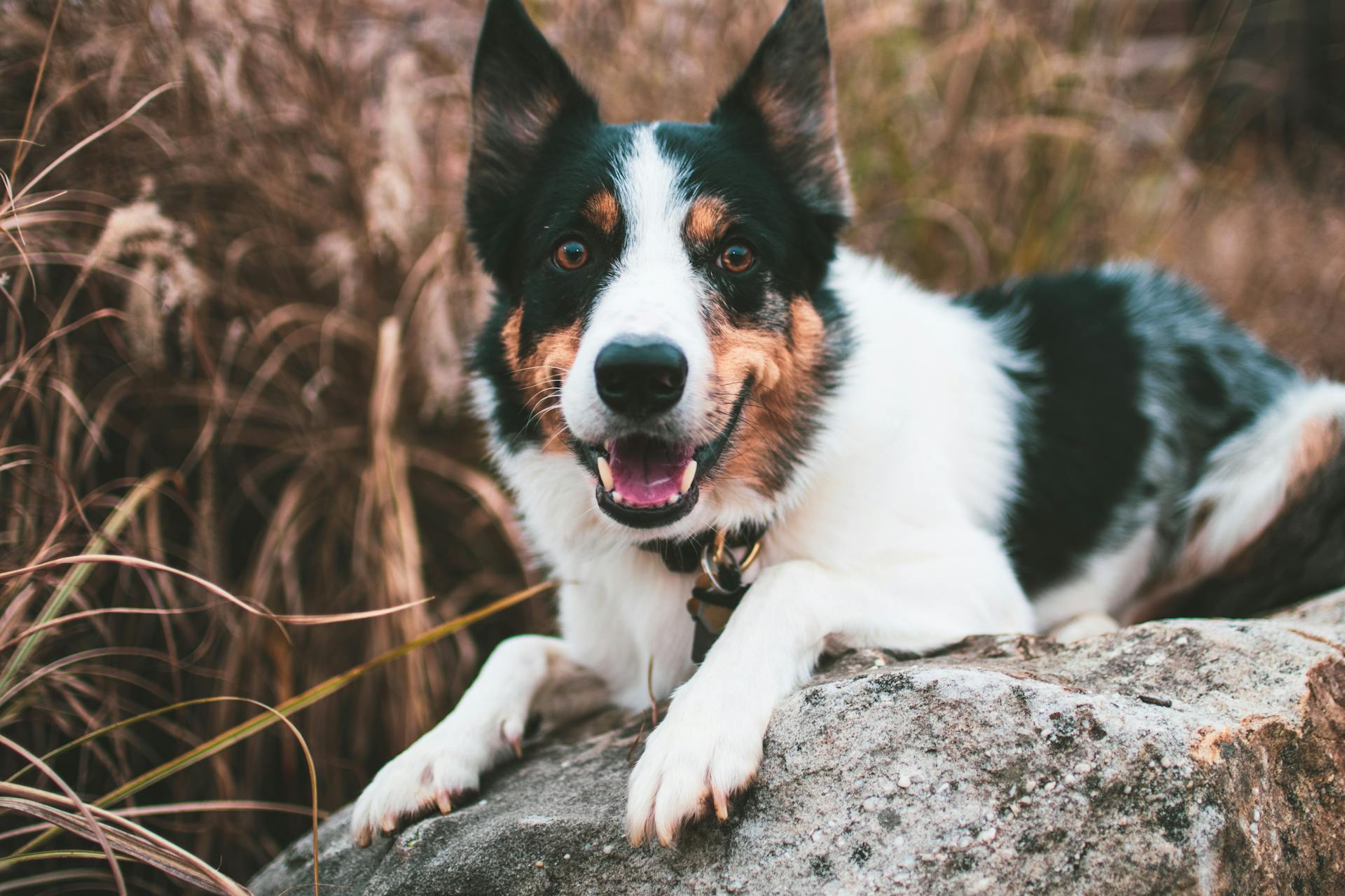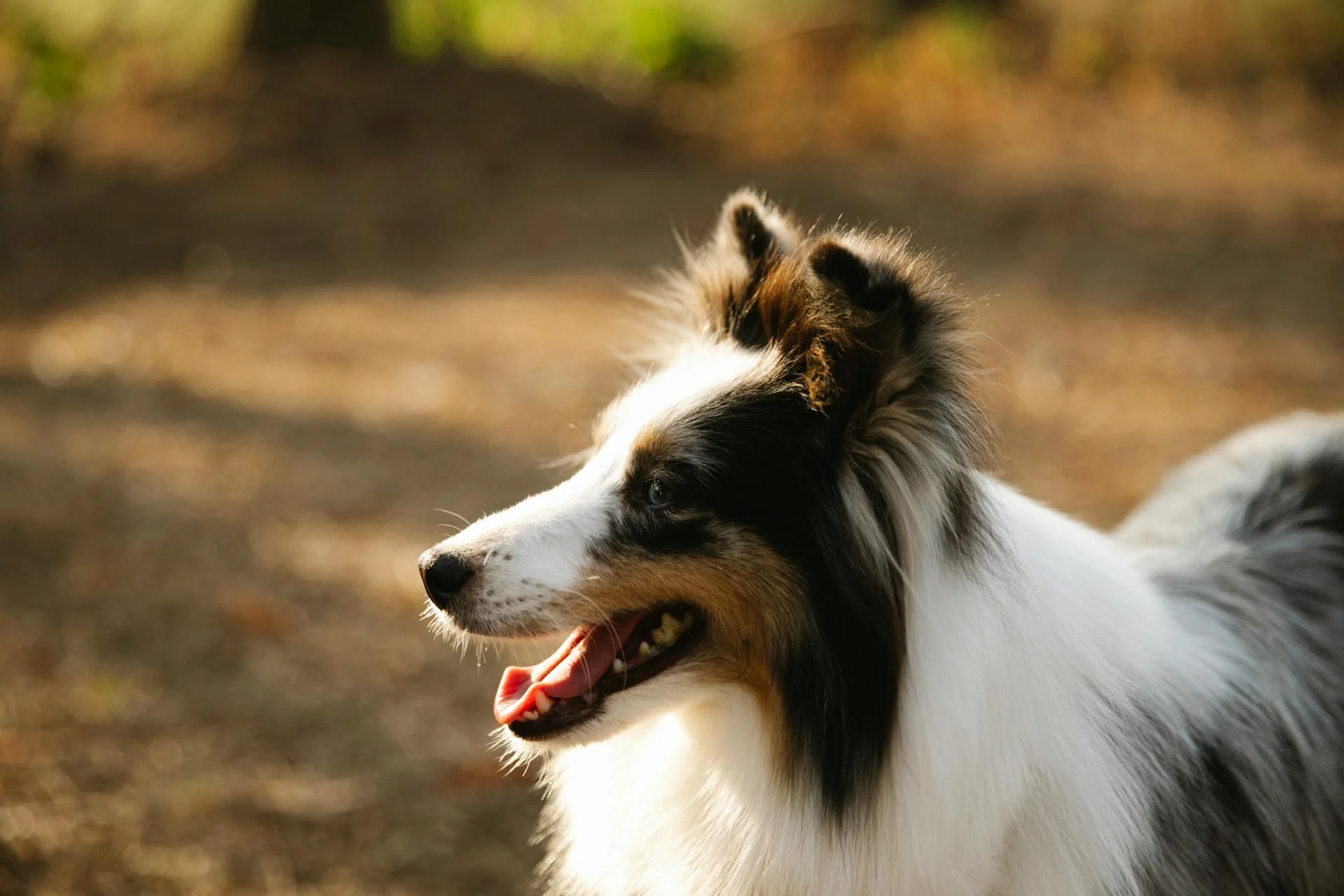
The Rough Collie and Border Collie are two of the most popular breeds of herding dogs in the world. They share a common ancestry, but have distinct differences in terms of appearance and temperament.
Both breeds have a strong herding instinct, but the Rough Collie is generally more laid-back and easy-going. The Border Collie, on the other hand, is known for its high energy level and intense focus on herding.
In terms of size, the Rough Collie is slightly larger than the Border Collie, with males weighing up to 75 pounds compared to the Border Collie's 55 pounds. The Rough Collie also has a longer, thicker coat than the Border Collie.
Check this out: Border Collies Herd Ducks
Breed Comparison
Both Border Collies and Rough Collies are intelligent and easy to train, but Rough Collies are better with one-on-one attention instead of being around lots of people.
Border Collies can be hyperactive, especially with kids, whereas Rough Collies are great family dogs due to their calm nature.
The average lifespan of both breeds is 12 to 13 years, but they're prone to similar health issues such as hip dysplasia, epilepsy, allergies, and cataracts.
Rough Collies can also suffer from thyroid problems, which is something to consider when deciding between the two breeds.
Both dogs require regular grooming, including brushing every once in a while and trimming their nails to avoid infections and discomfort.
They also need to be bathed every now and then to stay clean and healthy.
Health and Care
Collies are generally a healthy breed, but they do have some specific health concerns to be aware of. They are at risk of developing progressive retinal atrophy and Collie eye anomaly, both of which can lead to blindness.
Genetic tests can be used to identify and avoid breeding dogs with these conditions. Most Collies live anywhere from 10 to 15 years with proper care.
Their dietary needs are relatively simple, and they do well on protein-rich, high-quality commercial pet food that meets American Association of Feed Control Officials (AAFCO) guidelines.
Personality and Temperament
Border Collies, Rough Collies, and Scotch Collies share some similarities in terms of personality and temperament. They are all protective, intelligent, and responsive.
One key difference is their sensitivity level. All three breeds are sensitive to irregular daily routines, noisy households, and frequent guest visits. This means they thrive in calm and predictable environments.
Border Collies are genuinely loyal and affectionate dogs, often forming strong bonds with their handlers. They are also intelligent and trainable, but can be prone to separation anxiety when left alone.
Rough Collies and Scotch Collies share similar traits, including being loyal, gentle, and loving. However, they are also known for their high prey drive, which makes them better suited for hunting or activities that involve chasing small animals.
Here's a summary of the personality traits for each breed:
In terms of adaptability, all three breeds can adapt to lifestyle changes and different living environments. However, Border Collies tend to be more flexible and can thrive in a variety of settings.
Health and Care
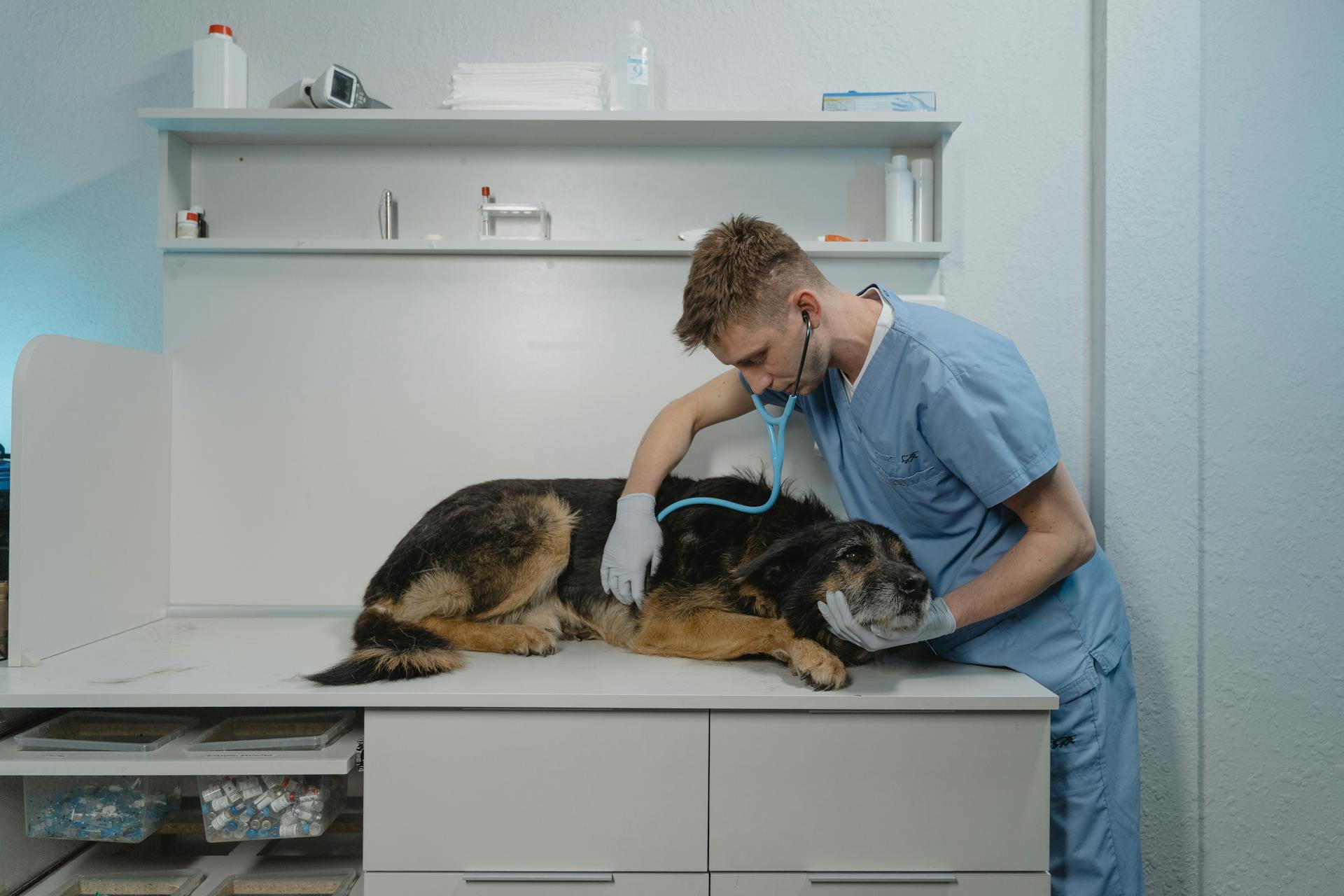
The average lifespan of a Border Collie is 13 years, while a Rough Collie can live up to 15 years, and a Scotch Collie lives for around 13 years. Regular veterinary visits are essential to ensure your Collie stays healthy.
Collies are generally healthy breeds, but they can be prone to certain health issues. Hip Dysplasia, allergies, and Progressive Retinal Atrophy (PRA) are some of the common health problems that can affect them.
A Border Collie may need to visit the vet more frequently due to its higher risk of Hip Dysplasia and other health issues. However, with proper care and regular check-ups, many Collies can live long, healthy lives.
Here's a comparison of the health problems common in each breed:
Collies are sensitive to certain weather conditions, preferring average to cold weather. However, this can vary from dog to dog, so it's essential to observe your Collie's preferences and adjust your care accordingly.
Weight Management
Maintaining a healthy weight is crucial for your furry friend's overall well-being. The good news is that all three breeds - Border Collie, Rough Collie, and Scotch Collie - have an average risk for obesity, which means they're not naturally prone to packing on the pounds.
To keep your Collie at a healthy weight, it's essential to monitor their food intake. According to the comparison, Border Collies require 1.5 to 2 cups of high-quality dry food per day, divided into two or three meals, while Rough Collies and Scotch Collies need 2 to 3 cups of high-quality dry food per day, divided into two meals.
Here's a quick rundown of the food requirements for each breed:
By feeding your Collie according to their breed-specific needs, you can help them maintain a healthy weight and reduce the risk of obesity-related health issues.
Allergies and Grooming
If you're considering bringing a new furry friend into your life, but you or a family member suffers from allergies, it's essential to choose a breed that's hypoallergenic.
The Border Collie, Rough Collie, and Scotch Collie are all popular breeds, but they have different allergy-friendliness levels. Unfortunately, none of these breeds are considered hypoallergenic, as they all produce some level of dander.
If you're looking for a low-maintenance grooming routine, the Border Collie might be a good choice. They require average grooming effort, with a dense, feathered coat that's straight and short.
On the other hand, the Rough Collie and Scotch Collie require more frequent grooming sessions. The Rough Collie needs a lot of work to keep its coat in good condition, while the Scotch Collie requires advanced grooming.
Here's a quick comparison of the three breeds' grooming needs:
Keep in mind that while these breeds may have different grooming needs, regular grooming sessions can help reduce shedding and prevent matting.
If you're concerned about drooling, you'll be happy to know that all three breeds have a very low drooling tendency. However, if you're looking for a breed with the least amount of natural smell, you may be disappointed – all three breeds have an average chance of bad smell.
Curious to learn more? Check out: Rough Collie Grooming
Working and Recognition
The Border Collie and Rough Collie are both highly skilled herding breeds, but they have some differences in their recognition and classification.
The American Kennel Club (AKC) recognized the Rough Collie as a Herding breed in 1885, while the Border Collie was recognized in 1995.
The Rough Collie has more recognition internationally, being recognized by the Federation Cynologique Internationale (FCI) in the Sheepdogs and Cattledogs group, in the Sheepdogs section.
Related reading: Border Collies Herding Sheep
Working Dog
As a working dog, a Border Collie is an excellent choice for service work. They have a high service dog potential and can excel in therapy work, making them a perfect therapy dog. After proper training, they can also excel at scent detection.
In contrast, the Rough Collie also has a high service dog potential and can make a perfect therapy dog. However, they are not typically used as search and rescue dogs.
If you're looking for a breed that's not as commonly used for working tasks, the Scotch Collie is generally not used as a service dog or a therapy dog, but there may be exceptional cases.
Here's a quick rundown of the breeds' working dog potential:
Recognition
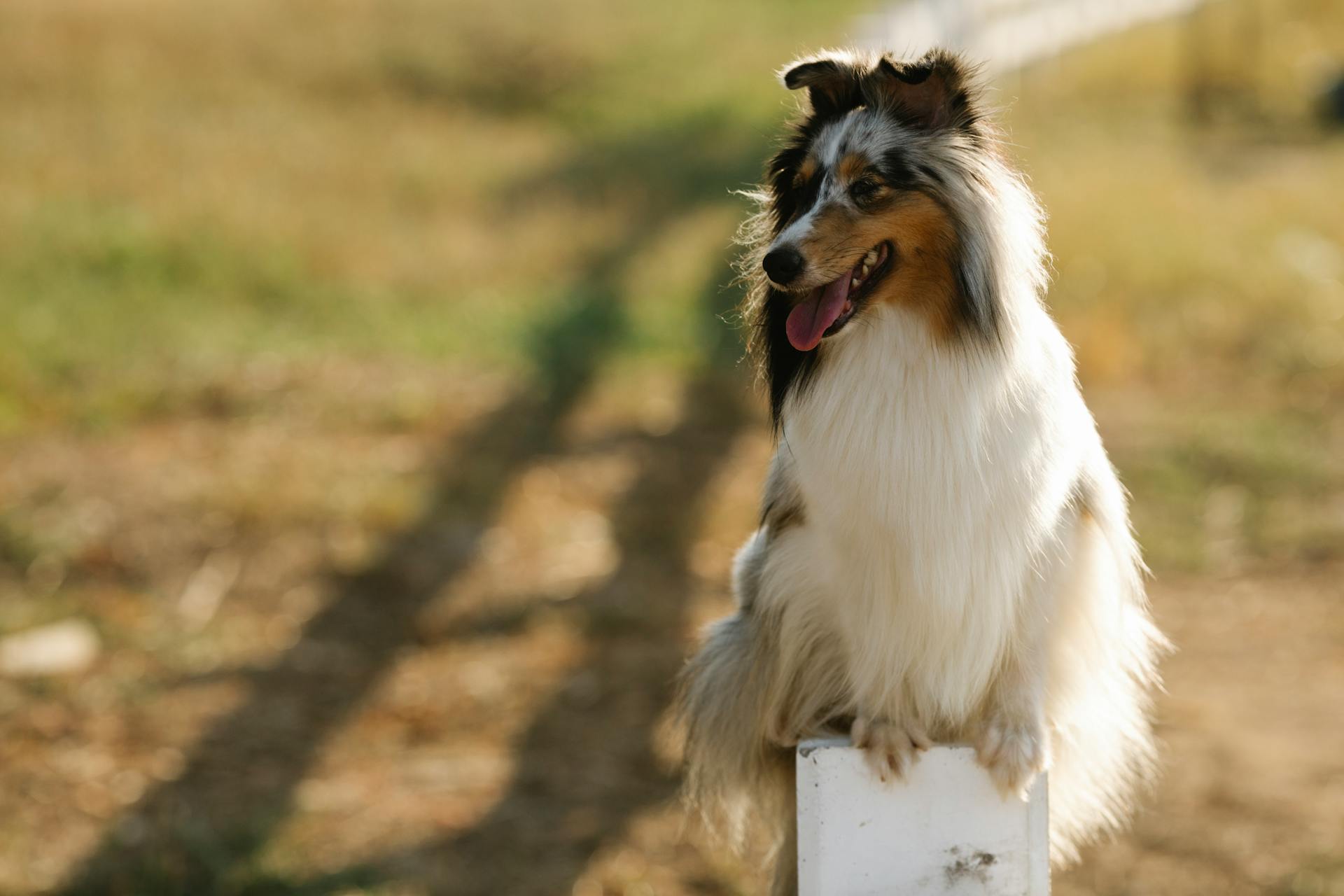
The Border Collie, Rough Collie, and Scotch Collie all have a rich history of herding, but when it comes to recognition, there's a significant difference between them.
The American Kennel Club (AKC) recognized the Rough Collie in 1885 as a Herding breed, while the Border Collie was recognized in 1995. The Scotch Collie, on the other hand, is not recognized by the AKC.
Internationally, both the Rough Collie and the Border Collie are recognized by the Federation Cynologique Internationale (FCI) in the Sheepdogs and Cattledogs group, while the Scotch Collie is not recognized by the FCI.
In terms of kennel club recognition, the Rough Collie has the most recognition, with 13 kennel clubs around the world acknowledging the breed, including the American Kennel Club, the Canadian Kennel Club, and the Kennel Club of Great Britain. The Border Collie is also recognized by 13 kennel clubs, while the Scotch Collie is only recognized by the Dog Registry of America Inc.
Here's a comparison of the recognition status of the three breeds:
Choosing the Right Breed
If you're set on adopting a purebred dog and deciding between a Collie and a Border Collie, consider your household and lifestyle. If you're young, highly active, and have the time and energy to devote many hours to your new puppy, a Border Collie is probably the best fit.
Border Collies are far more energetic and active than Collies, requiring more exercise and attention. They often do better in homes without small children or other pets due to their strong herding instincts.
Collies, on the other hand, are generally more relaxed and laid-back at home, making them a great choice for larger families with a lot of space. They require substantially less exercise and are more content to be with you rather than needing to be constantly doing something.
Both breeds are fiercely intelligent and capable of learning, but Border Collies can be more difficult to train due to their high energy levels. Collies, however, generally do fine with human companions lacking in experience.
Here's a quick comparison of the two breeds:
Collies with gorgeous, long, rough coats often require more grooming, but both breeds do best with daily brushing during shedding season.
General Information
Collies are generally happy to just hang out and be mellow, requiring about 1 hour of daily exercise to keep them satisfied.
They have a fair amount of energy, but their herding instincts are generally sufficiently under control that they do reasonably well around children and other animals, including cats and strange dogs.
Training and Care
Training a Collie is relatively simple since they're eager to please and highly intelligent dogs that go out of their way to make their humans happy. They're one of the brightest dog breeds, ranking highest in intelligence.
Border Collies are easy to train, while Rough Collies and Scotch Collies are very easy to train. This makes them a great choice for first-time dog owners. With consistent training and guidance, Collies can learn to limit their barking and become well-behaved pets.
Collies typically enjoy learning tricks and commands during training. They're often eager to please and easy to train. Positive training methods work incredibly well with Collies, using praise and treats to reinforce and motivate good behavior.
See what others are reading: Are Border Collies Easy to Train
Early socialization is crucial for Collies, teaching them to interact with new people and deal with novel stimuli and situations. They can begin basic obedience training as young as 8 weeks old. This will help them become confident and well-adjusted dogs.
Here's a comparison of the training difficulty levels of Border Collies, Rough Collies, and Scotch Collies:
With proper training and care, Collies can become wonderful companions. They're highly intelligent and eager to please, making them a joy to work with.
Frequently Asked Questions
What is the difference between a Smooth Collie and a Rough Collie?
The main difference between a Rough Collie and a Smooth Collie is the length of their coat, with Rough Collies having a double coat and Smooth Collies having a single, smooth coat. The Rough Collie also has a distinctive mane, frill, and tail hair.
Sources
- https://dogell.com/en/compare-dog-breeds/border-collie-vs-rough-collie-vs-scotch-collie
- https://www.dogster.com/dog-breeds/collie-vs-border-collie
- https://wagwalking.com/daily/rough-bearded-or-border-which-collie-is-right-for-you
- https://bittenbyermines.com/border-collie-rough-collie/
- https://www.hepper.com/collie-vs-border-collie/
Featured Images: pexels.com

